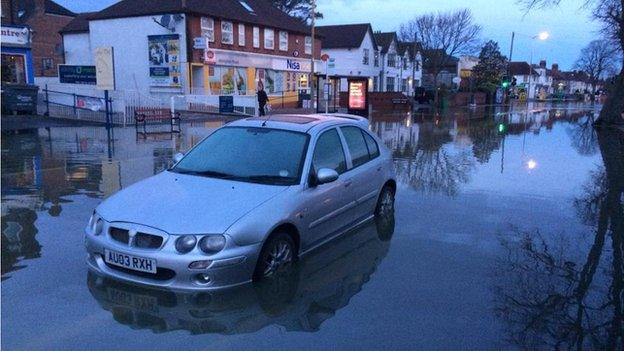Flooding: Insurers count the cost
- Published

Just how much damage the floods have done to homes and businesses is not yet clear
With dramatic images of flood damage in the Thames Valley as well as rural Somerset, inevitably there is speculation about the clean up costs.
Insurers and business organisations met in Downing Street on Tuesday to thrash out how to help businesses and homeowners as quickly as possible.
The wettest January on record and continuing rain in early February could have major financial consequences as insurers are obliged to fund a substantial repair operation.
Severe flooding in the UK is not unusual.
In 2007 there was extensive damage in several urban areas including Hull and Tewkesbury. The insurance bill for this year's flooding could well end up a lot lower than the payouts required seven years ago.
Between May and July 2007, England and Wales experienced the wettest conditions in 200 years. Nearly 50,000 households were affected.
So far, about 5,000 homes are believed to have been affected in the current floods, although that figure is likely to rise of course.
According to the Association of British Insurers (ABI) there were payouts of £3bn as a result of the summer floods in 2007.
Across the whole of 2012, flooding caused damage worth £4bn. The ABI believes storms at the end of December and over the New Year have generated bills of £426m.
Higher premiums
Insurance advice for famers and other flooded businesses
According to the insurer Hiscox, the latest floods could, if they continue for a couple more weeks, result in payouts of about £1bn. This would still be well short of the claims seven years ago.
Insurance experts at the consultancy firm Deloitte concur with that figure. But they warn that consumers will probably have to pay higher premiums as a result of the latest flooding.
Experts say the final bills will depend on how long the wet weather lasts, and how many more households and businesses suffer damage to their properties.
In terms of disruption to the economy, it is too early to say.
Retailers may lose business if rail links are disrupted for some time.
That said, some analysts point out that repairs to rail lines and other infrastructure will support economic growth.
- Published18 February 2014
- Published11 February 2014